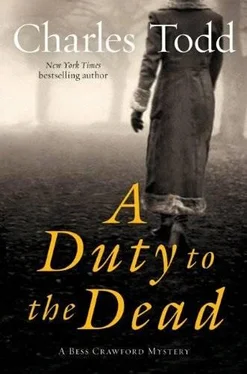But he slept after that, and when Susan came to the door with my dinner, asking how he was, I said only, “There’s no change. Still, if Mrs. Nichols could prepare a soup for me-nothing too heavy, chicken stock and rice to thicken it, and a little meat, minced fine, and perhaps a little wine too, I’ll see if he can keep it down. He’s frighteningly weak, we must do something.”
“There’s fresh bread as well, for sops,” she told me, and then left without asking to see the sick man.
Two hours later, she brought the soup in a covered bowl and half a loaf of bread wrapped in a linen cloth, handing them in at the door.
I was able to cajole Peregrine into trying a little, and it must have been to his liking because he took nearly a third of a cup. And he kept it down, which I told myself was a good sign. Close to two o’clock, I brought him more, and again at six, finishing the container a little after eight the next morning.
I spent the night in my chair where I could watch him and hear the slightest sound, though by dawn, my cot beckoned, and I felt the stiffness across my shoulders and in my back. The chances of a relapse were very good, and I couldn’t risk that. But as the new day dawned, he was cool to the touch and resting well.
I rested myself that morning, realizing how hard a vigil it had been, and was grateful for the hot water that Susan brought with my breakfast so that I could wash my face and hands. It did very little to wake me fully.
My patient studied me in silence as I moved about the room, and I grew accustomed to finding those watchful eyes on me whenever Peregrine was awake.
“Why are you here?” he asked me late in the afternoon.
“To look after you.”
“No. Why are you here?”
“I was with your brother when he died. There were messages he wanted me to carry for him.”
“Messages?”
“Personal ones. To his brother.”
“Do you carry such messages to the family of every soldier you nurse?”
I could feel myself flushing. “No. But in Arthur’s case, you see, he thought he was recovering. And then everything changed.”
He didn’t reply, and I thought perhaps he’d fallen asleep. If I’d had any doubts about his ability to understand his surroundings, they were erased now. He could think, he could reflect on what was said and draw coherent conclusions, and he spoke like a rational man. But madness had its rational moments, I reminded myself. What’s more, I had no knowledge of what he was like before entering the asylum. Or what help, if any, he was given there.
If his tutor had despaired of him, why was he able to use his brain so well now? And if he had been given treatment that produced this mental agility, why did he not know his brother had been killed, how the war was progressing, or what year it was? It was a contradiction I couldn’t quite fathom.
What he said next shocked me. “A pity it wasn’t Jonathan who died, rather than Arthur.” His eyes were still closed.
“You can’t mean that!” I said, thinking how cruel it was.
“I do. I’ve hated him for years. Ever since I can remember.”
I didn’t know quite what to say. And then I recalled that others had called Peregrine “different.” Perhaps that was why he disliked his brother so intensely-if Jonathan had been held up as an example of what Peregrine ought to have been, and failed to achieve, it would breed jealousy. Frankly, I wouldn’t have put it past Jonathan to tease Peregrine unmercifully. Not after what he’d said about Ted Booker.
Finally, I replied, “He’s your brother.”
“I doubt it.”
I smiled. I had heard children quarrel in much the same vein. But then those dark eyes flicked open, and he seemed to pin me there in my chair. “I was separated from my brothers at an early age. There was little love lost between us.”
“Do you know why you were kept away from them?”
He turned his head to look out the window, agitated. “I always believed it was because my father died.”
I had the feeling that this wasn’t a safe subject for conversation. Until now, Peregrine had made good sense. Sometimes madness turned on small grievances, and I didn’t wish to provoke him into violence.
“That must have been a difficult time for you. You must have been little more than a child-” I’d meant it as conciliatory, but he didn’t take it that way.
“Later I wondered if she killed him or if she persuaded Robert to do it for her.”
That was surely a madman speaking-
There was a tap at the door, startling both of us. We turned toward it, as if expecting-what? After the briefest hesitation, I went to open it. It was Susan with another covered jar of soup.
I took the jar from her and set it on the hearth. By the time I’d spooned half a cup of it into his bowl, Peregrine seemed to have forgotten what we were talking about. I wasn’t about to bring it up again. He drank the soup without comment, and lay back against his pillows, tired enough to sleep.
I went back to my chair. I hadn’t been trained in the field of various forms of madness. We’d been more concerned with the destruction of the body, by illness or weaponry. I wished I could ask Dr. Philips for his opinion.
And now I was uneasy in this sickroom, where I hadn’t been before.
But I needn’t have worried. That was the only time my patient broached the subject of his brothers or his father’s death.
Later that evening as I sat by the fire, Peregrine cried out. It was so sudden I nearly leapt out of my skin. But when I turned toward the bed, he was lying there asleep, one arm flung out and his body half twisted to one side. I realized that he was dreaming. I heard him say, his voice muffled, “Please-,” and again, as if pleading, “Please-.” After that, he was quiet and didn’t rouse again until it was time for his soup at ten o’clock.
It was while Peregrine was finishing the cup that Timothy came to the door, knocking tentatively, to ask about his brother. But when I opened it, he stepped back, as if afraid he might find himself looking into the room beyond.
It occurred to me that the family had expected that my nursing skills were not up to saving Peregrine Graham, and they were now wondering why I hadn’t appeared with the sad news of his death. They had made no effort to send Dr. Philips to the patient. I wondered if they would have, if I’d sent down to ask for his help.
“I’m cautiously optimistic,” I responded to his question. “It’s too early to say what the outcome may be.”
It was a habit I’d fallen into, working with the wounded. Orders were to find them fit again as quickly as possible and send them back to the fighting-men were in short supply, malingerers not tolerated. I often sought to keep a man who was exhausted, still weak, or pretending he was healed when I knew very well he was not. It made no sense to me to send someone back to die his first day. And I wasn’t convinced that this patient was well enough for the long, cold ride back to that tall, forbidding house behind its high walls. As well, the building clouds at dusk had spoken of snow, and I had seen the winter birds huddled in the bare trees, out of the wind, a sign of foul weather.
Timothy nodded, thanked me, and quickly walked away.
Peregrine, who had overheard the brief conversation, said with some bitterness, “I expect they’re eager to see the back of me. Or else he’s afraid I must be well enough now to overpower you and run amok in the house.”
“We shan’t worry about that until you can overpower your soupspoon,” I retorted. For his hands shook with the palsy of weakness as he tried to drink or feed himself.
When he didn’t reply, I said, “Mr. Graham. Would you wish to see the doctor or the rector? I’ll ask for them on your behalf, if you like.”
Читать дальше












